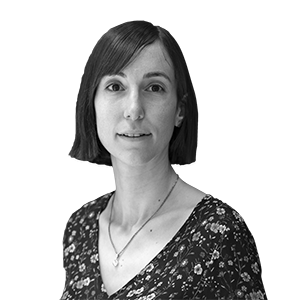Wanting the first child very much, not wanting the second
Writer Berta Dávila explores the facets of motherhood and postpartum depression in her book "Los seres querido" (Loved Ones).


BarcelonaFor a long time, the Galician writer Berta Dávila (Santiago de Compostela, 1987) felt that a book was lurking inside her. Deception Island (Galaxia, 2020) had explored loss, but she lived with the feeling that she had yet to talk about the children she didn't have, the impact of motherhood, and the woman she ceases to be when she becomes a mother. Loved ones (Xerais, 2022), which Les Hores now publishes in Catalan with the title Loved ones with a translation from Galician by Eduardo Velasco. Dávila's new book is the story of a woman who has been suddenly transformed by motherhood and forced to rethink the nature of her relationships. "We can't fall into commonplaces. This was the great challenge," explains the writer, who is also the author of The imaginary wound (Les Hores, 2023) and has been awarded prizes such as the Xerais 2021 and the Galicia Critics' Award 2023. Dávila was aware that exploring the darkest corners of motherhood "involved, as Rachel Cusk says, move to the back of the plane," but that didn't stop her. "I needed to write about the strangest parts of being a mother and I decided to do it through a protagonist who has a story about choice," she notes.
became pregnant unexpectedly. Conceiving her first child wasn't easy ("it turned out to be an enormously technical project," writes Dávila) and, despite everything, when the second arrives she decides to have an abortion. In this place, I don't want to go back," says the protagonist to justify herself. The decision leads her to remember how she lived the first months of motherhood and how everything she had imagined didn't match reality.
"The book is a mirror of two moments that have a lot to do with the desire to be or not to be a thing," says D. meanings of dear ones (loved, but also desired) to refer to "those who are loved or unwanted, to whether this second child comes or not," she explains: "Motherhood is linked to a bond of great dependency that I had never experienced before, or at least not in that way." The protagonist is ruled by guilt and regret and often tells herself that she is not a good mother or that she is not the mother she should be. "She is at a moment of maximum vulnerability, of self-questioning because all her actions have repercussions on someone else. She has the feeling that there is a specific childcare item for each specific guilt. They don't solve any logistical problems; generally, at that stage, not so many things are needed, but they respond to this feeling of being fallible."
The gaze on other mothers
While making an appointment at a private clinic for an abortion, the protagonist's grandmother falls ill and dies. The situation unsettles her, especially because, since having a child, her relationship with her grandmother has taken on a different meaning. "Motherhood transforms our understanding of other women who have been mothers and grandmothers. Until then, we understood them as daughters; then we began to understand them a little more as mothers," notes the writer, who conceives of the grandmother's character "as the first mother in the chain" and someone "with whom it is no longer possible to dialogue."
Formally, Loved ones It can be read as a first-person memoir about motherhood. The writer conceived the book as a fiction novel, but she wanted to dress it up as an autobiography to give free rein to the ambiguity. "I like the novel not to feel like a novel, to write fiction that doesn't feel like fiction. It's a book without a dramatic conflict and with a very central theme," notes the author, who was surprised by the reader reception when she published the original in Galician. "Suddenly, debates began to emerge about issues that don't appear in the novel, such as work-life balance or breastfeeding," she recalls. "The topic consumed the novel, but the book served as a pretext to talk about things that were buried beneath the general concept of motherhood."
